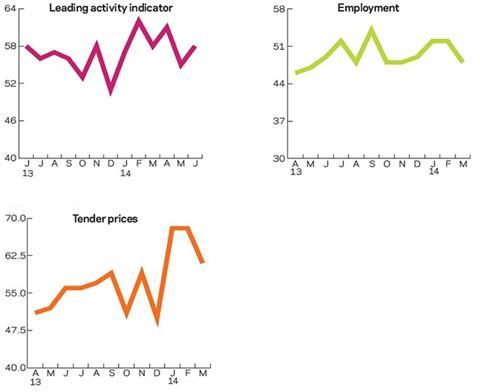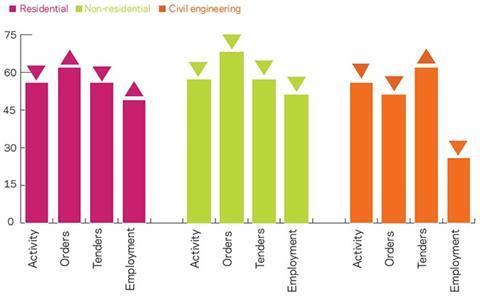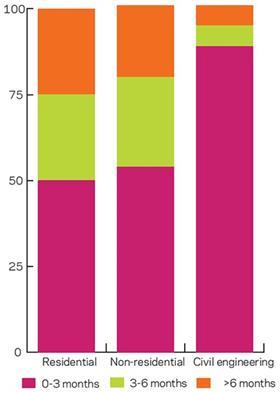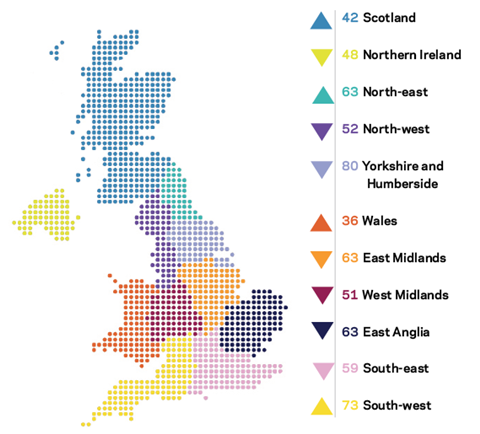Construction activity showed a slight fall in the third month of the year but remained in positive territory, pointing towards a period of sustained expansion. Experian Economics reports
01 / State of play
After growing at a respectable clip for two consecutive months, Experian’s construction activity index fell four points to 58 in March. Despite this, the index remained in positive territory for 19th successive month, pointing towards a period of sustained expansion. At the sector level, activity declined across the board, with civil engineering experiencing the largest fall of 11 points to 56, non-residential activity followed with a six-point decline to 57, while the residential index edged down one point to 56.
The orders index saw an uptick in March, rising four points to 65, its highest value since October of last year. Conversely, tender enquiries fell one point to 56. However, this fall could be interpreted as a correction from the unusually high level reached at the beginning of the year.
The proportion of respondents indicating that insufficient demand was restricting productivity was unchanged at 39%. Those indicating that they were experiencing no constraints on activity rose to 35% in March, while those who felt bad weather was a factor rose slightly to 8%. Labour and material/equipment shortages remain of little worry, as only 1% of respondents suggested these were of concern. Financial constraints became less of an issue with 15% of respondents indicating their liquidity was depressing activity, down from 17% in the previous month.
The employment prospects index was down on a month-by-month basis, with a four-point reduction to 48. Indicating that businesses expect employment levels to fall over the next three months.
Tender prices remained above the 60 mark for the third consecutive month in March, although the series was down seven points month-on-month.
02 / Leading construction activity indicator


CFR’s Leading Construction Indicator is expected to rise in April, before activity falls in the following month.
The indicator uses a base level of 50: an index above that level indicates an increase in activity, below that level a decrease.

03 / Work in hand
During March, around 50% of residential respondents reported less than three months’ work in hand while for non-residential and civil engineering firms this was 54% and 89% respectively. The non-residential sector saw the highest proportion of respondents (26%) reporting that they had enough work to keep them active for between three and six months.
The residential sector reported that 25% of work was readily available after six months. Approximately 21% of non-residential firms reported that they had more than six months of work in hand while for non-residential respondents this was around 6%.
04 / Regional perspectives
Experian’s regional composite indices incorporate current activity levels, the state of order books and the number of tender enquiries received by contractors to provide a measure of the relative strength of each regional industry.
Four out of 11 regions and devolved nations saw an increase in their indices. The North-east and South-west both saw an increase of four points to their respective indices, taking the former to 63, and the latter to 73.
Scotland and Wales both saw a moderate gains, the former was up two points to 42, and latter ticked up one point to 36. Despite this, both indices remained significantly below the no-change mark, with Wales sitting firmly in negative territory for the 12th straight month.
Yorkshire and Humberside saw the sharpest contraction in March, falling six points on a monthly basis to 80, although the figure is 27 points above its value for the same period of 2013. The region’s index has been particularly strong over the last 12 months, ranging from a low of 60 in September, to a high of 103 in December. The West Midlands and North-west were also down, as the former fell three points to 51, and the latter four points to 52. Northern Ireland, East Midlands, East Anglia and the South-east all saw moderate declines.
In March the UK index, which includes firms working in five or more regions rose two points to reach 63, its highest level since February 2008.

This an extract from the monthly Focus survey of construction activity undertaken by Experian Economics on behalf of the European commission as part of its suite of harmonised EU business surveys.
The full survey results and further information on Experian Economics’ forecasts and services can be obtained by calling 0207-746 8217 or logging on to www.experian.co.uk/economics
The survey is conducted monthly among 800 firms throughout the UK and the analysis is broken down by size of firm, sector of the industry and region. The results are weighted to reflect the size of respondents. As well as the results published in this extract, all of the monthly topics are available by sector, region and size of firm. In addition, quarterly questions seek information on materials costs, labour costs and work-in-hand.






No comments yet